Yoni Halperin from "HaMeshamechim": "My Son is No Longer with Us, But His Spirit Compels Us"
In a poignant turn of events, Yoni Halperin learned the power of melody, and since then, he has led the volunteers of "Rachshei Lev". From the dark wards of Tel HaShomer, Yoni shares how a little light can dispel great darkness.
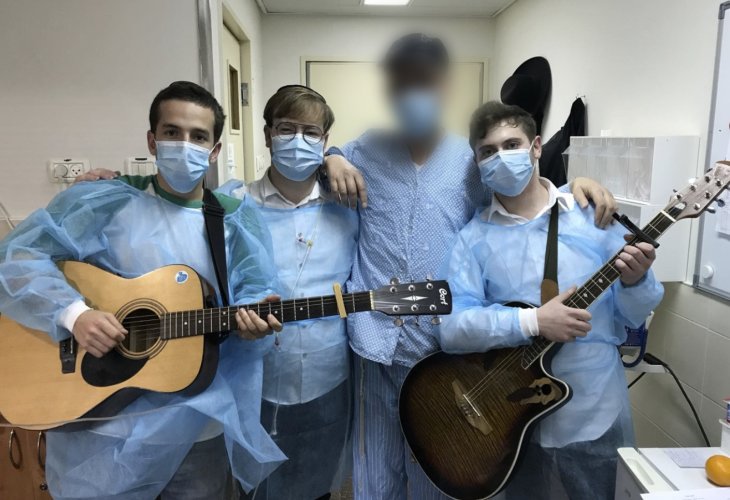 (Photo: HaMeshamechim Rachshei Lev)
(Photo: HaMeshamechim Rachshei Lev)I didn't expect to find them here; I didn't expect it. I'm used to seeing angels at work in the children's cancer wards, but here, in the silence of the adult cancer wards, I expected quiet. They surprised me!
I came to visit an acquaintance in the hematology department at Tel HaShomer, and that's where I met "HaMeshamechim of Rachshei Lev."
We usually see them in the pediatric wards of hospitals across the country. Why children? Because it always touches the heart more. "I couldn't accept the reality, the silence, the loneliness; I realized we needed to act. Yes, even here people long for human connection," Yoni Halperin sorrowfully tells me. "How did you become aware of these people's needs?" I ask, and Yoni falls silent. I decide to continue the conversation.
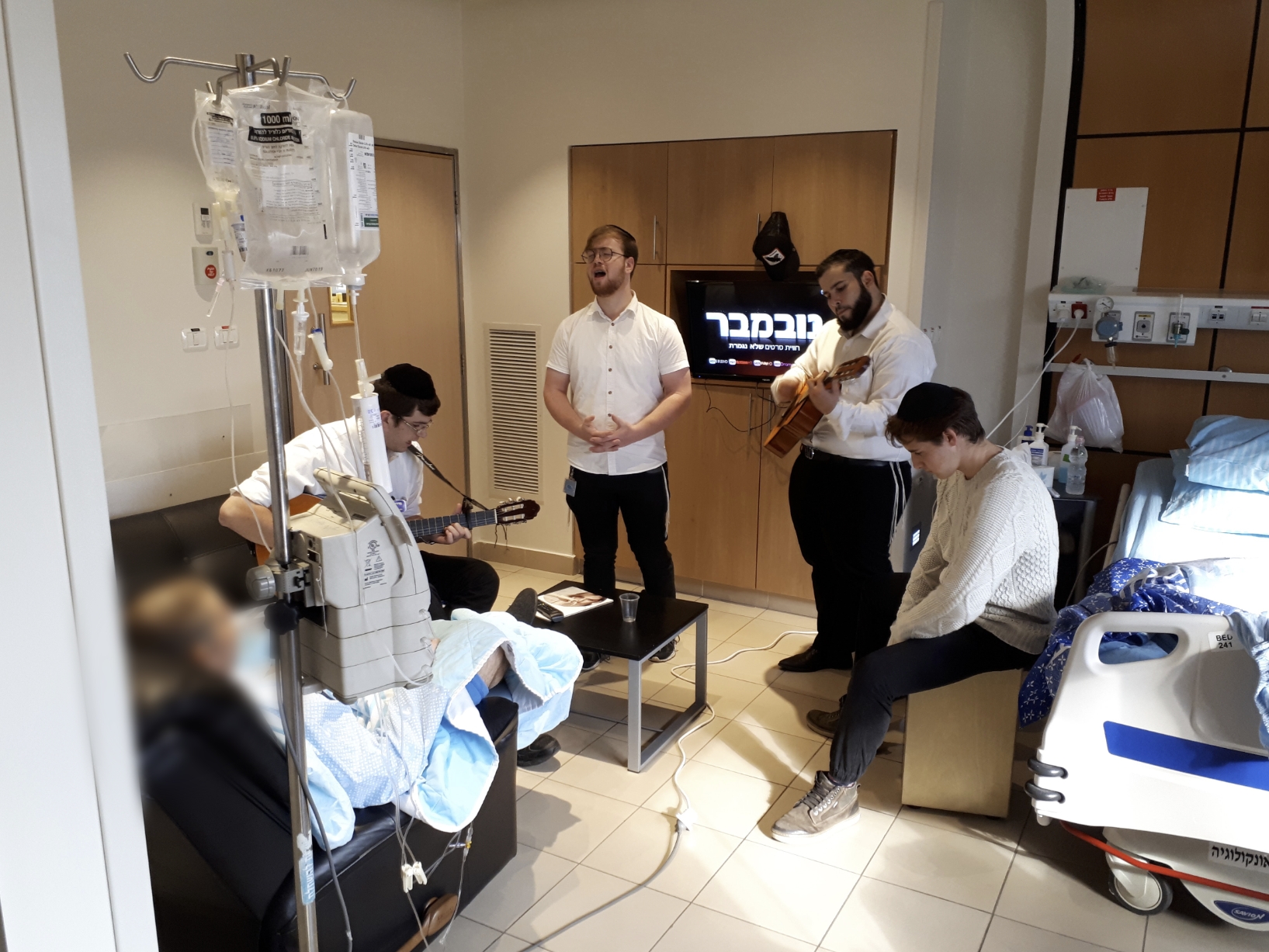 (Photo: HaMeshamechim Rachshei Lev)
(Photo: HaMeshamechim Rachshei Lev)Yoni (31), married and a father of three. In his daily life, his Torah is his craft, but between times, he founded the happiness branch of "Rachshei Lev." The volunteers in this department bring joy not only to smiling children but also to adults and elderly suffering from incurable diseases, who walk like shadows of people, without hope, on borrowed time.
A group of friends gathers together every week and visits the adult oncology departments at Tel HaShomer. The volunteers bring smiles to the faces of those who have forgotten what a smile looks like. "If people knew how much life they could give to these people, they would run every day and all day just to bring them joy," another volunteer tells me.
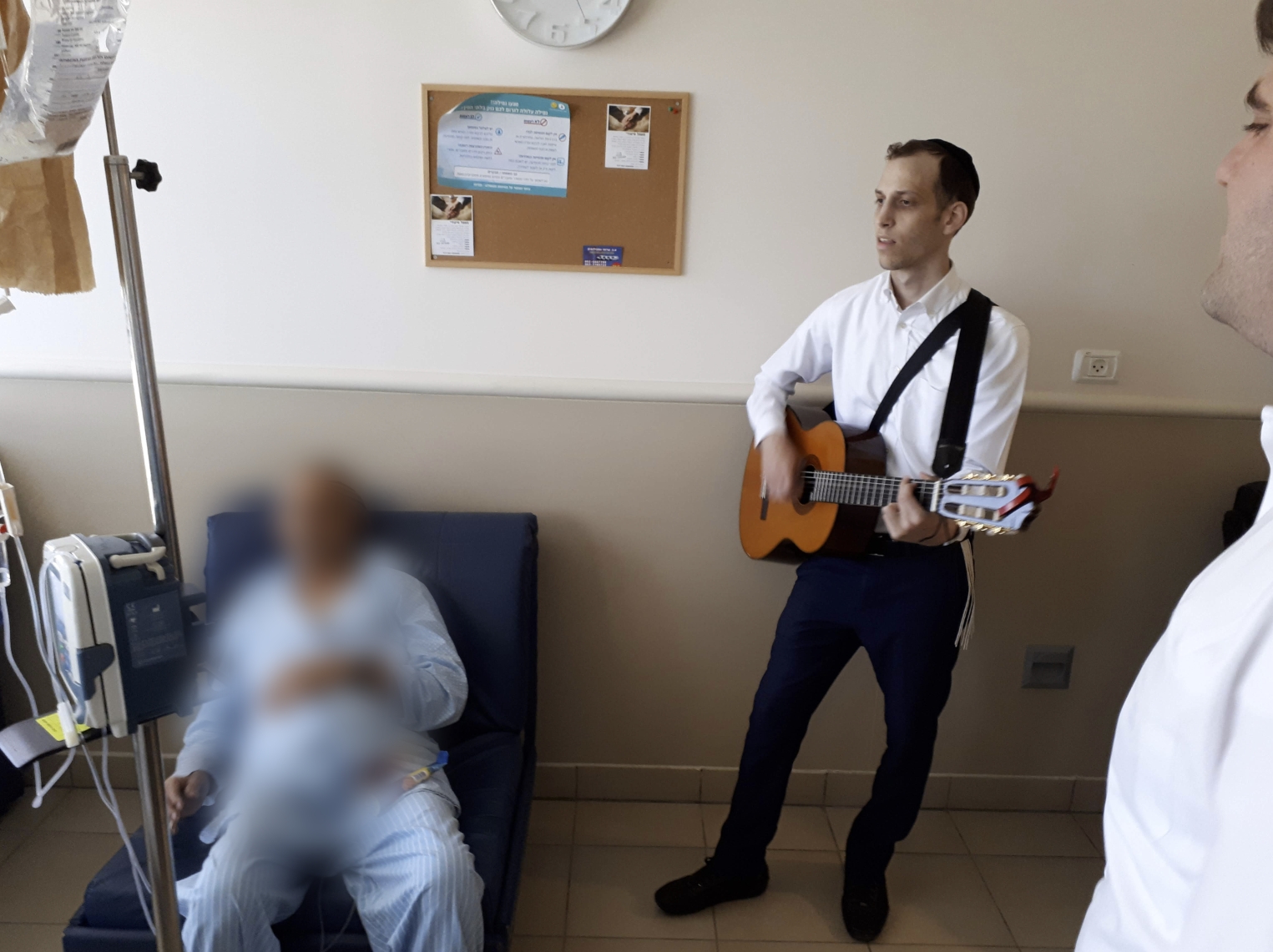 (Photo: HaMeshamechim Rachshei Lev)
(Photo: HaMeshamechim Rachshei Lev)I Realized How Much They Need This
During our conversation, I gather from Yoni's fragments of words that the decision to bring music and gather dozens of volunteers weekly did not happen without reason.
I dared to ask him, "When did you decide to dedicate your free time to this activity? Did you wake up one day and decide to go to Tel HaShomer to make people happy?" Yoni agrees to unveil how it all started. "My story began when my father was diagnosed with cancer almost a decade ago," Yoni lowers his voice and continues, "Dad suffered for four years from an illness he had no chance of recovering from. Most of the time, he managed as usual, but in the last year of the illness, he began to fade. Friends who saw his condition didn't allow him to break down, so every so often, dear friends would come to our home, set up a table and start a gathering that lifted him to other places. You need to remember that this was a time when there were no organizations that brought joy to adults. Organizations would only bring joy to children. Anyone over the age of eighteen was treated as if they were nearing a hundred and twenty."
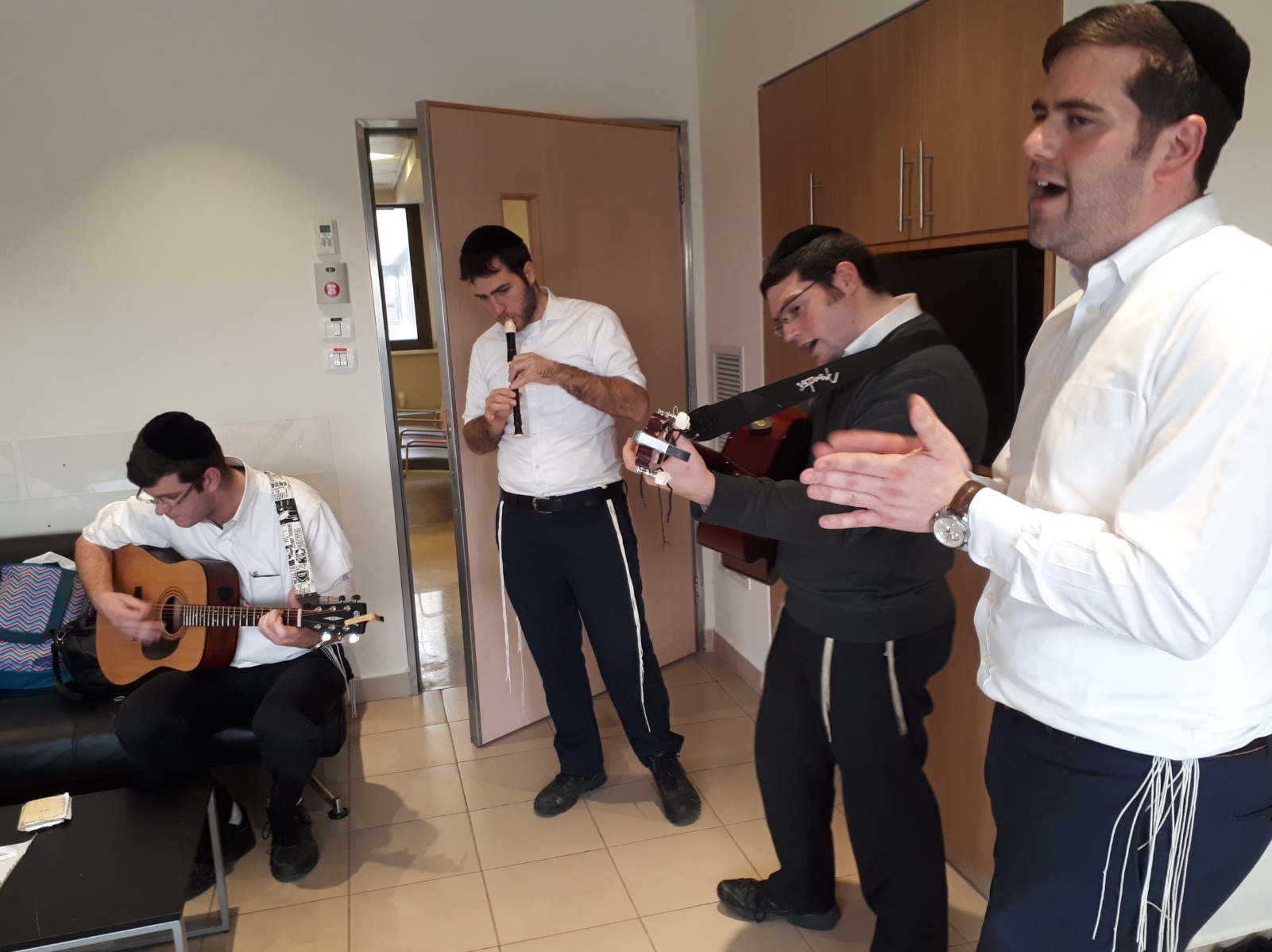 (Photo: HaMeshamechim Rachshei Lev)
(Photo: HaMeshamechim Rachshei Lev)"During his last Sukkot holiday, Dad lay dormant all day with oxygen. We were very worried and decided we wanted to hold a joy gathering for him, or a farewell party, call it what you will. We invited all his acquaintances, no exaggeration, there were hundreds of people who wanted to make Dad happy, and many musicians who played and uplifted his spirit for three hours. Dad was awake all evening. For me, being used to seeing him sleep most of the day and then suddenly seeing him awake for several consecutive hours, no words were needed, I understood the power of song."
When was the first time you went to play for another patient, someone who wasn't your father?
"It was when we were informed at the 'Kollel' about one of the scholars who had cancer. A few of us organized and went to Tel HaShomer to visit him. He was lying in a half-isolated room, Room 3, and we couldn't enter. We sat outside and started playing for him. While we were playing, he sent a message to one of the scholars. He wrote that it had been four days since he had eaten anything, but now, he felt an immense internal joy, which brought back his appetite. It was a sharp demonstration of the benefit of groups that play music and bring joy."
In such a sensitive situation, I take a step back before curiously asking Yoni about the condition of the scholar who fell ill. "It was very difficult, but thank Hashem, the scholar recovered. Who knows if it wasn't because of the strength we gave him," Yoni rubs his hands with pleasure and satisfaction.
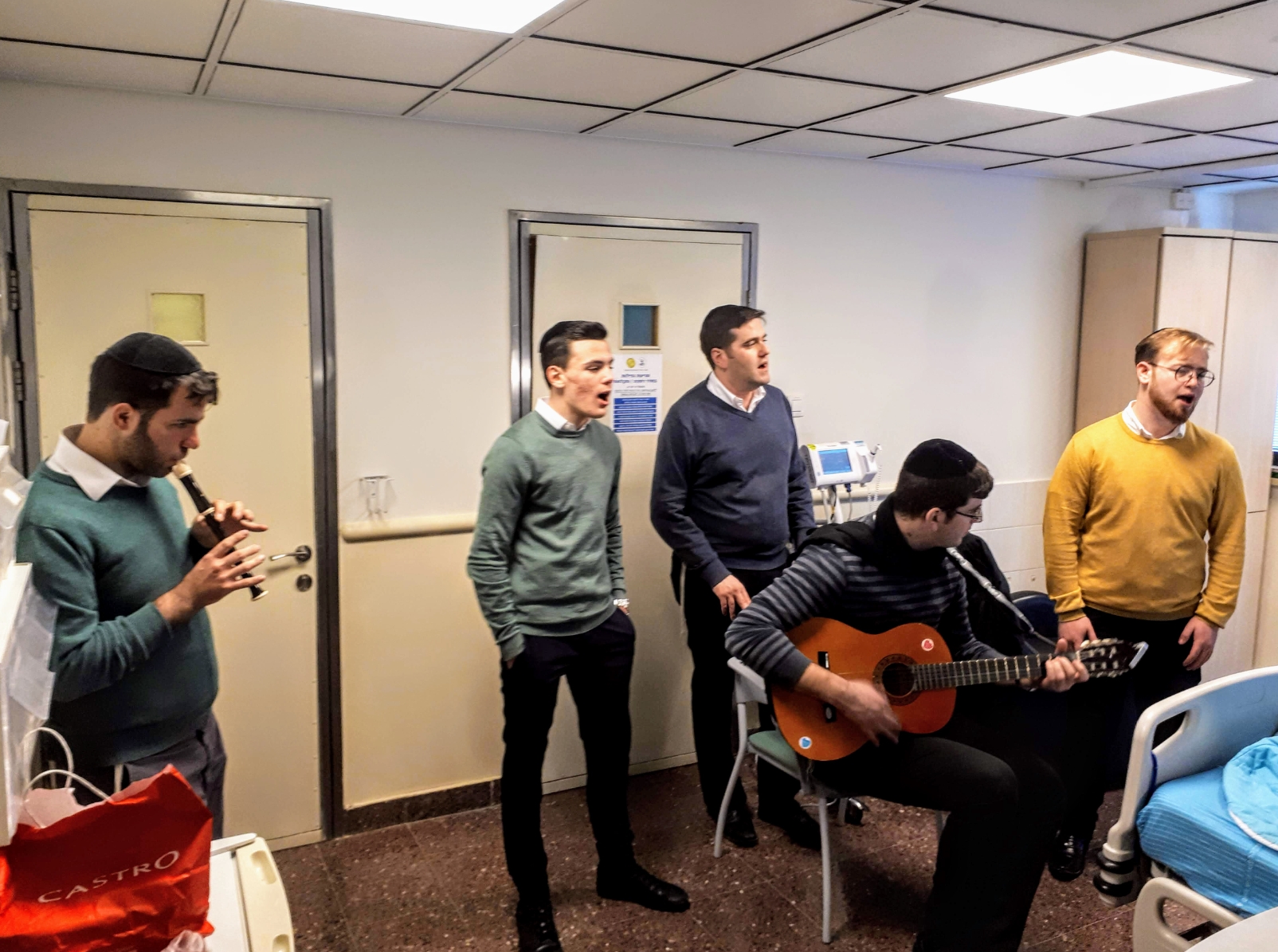 (Photo: HaMeshamechim Rachshei Lev)
(Photo: HaMeshamechim Rachshei Lev)
Reuven and Shimi, the Angels in Black and White
How did you become something bigger and institutionalized?
"During the spontaneous visits we conducted at Tel HaShomer, I met the man known as the 'Angel of Tel HaShomer,' R' Shimi Geshayd, CEO of 'Rachshei Lev.' There's no oncology patient who doesn't know Shimi and his father Reuven. They are angels in black and white, and not only for those in black and white but for everyone: religious, secular, Jews, and Arabs. Everyone who is a creation of Hashem.
"Shimi was always interested in our activities and made himself available for any assistance we needed. Sometimes it was a guitar string that snapped, sometimes a patient who wanted something tasty. Shimi was always there. The connection tightened slowly, or more accurately, it tightened quickly.
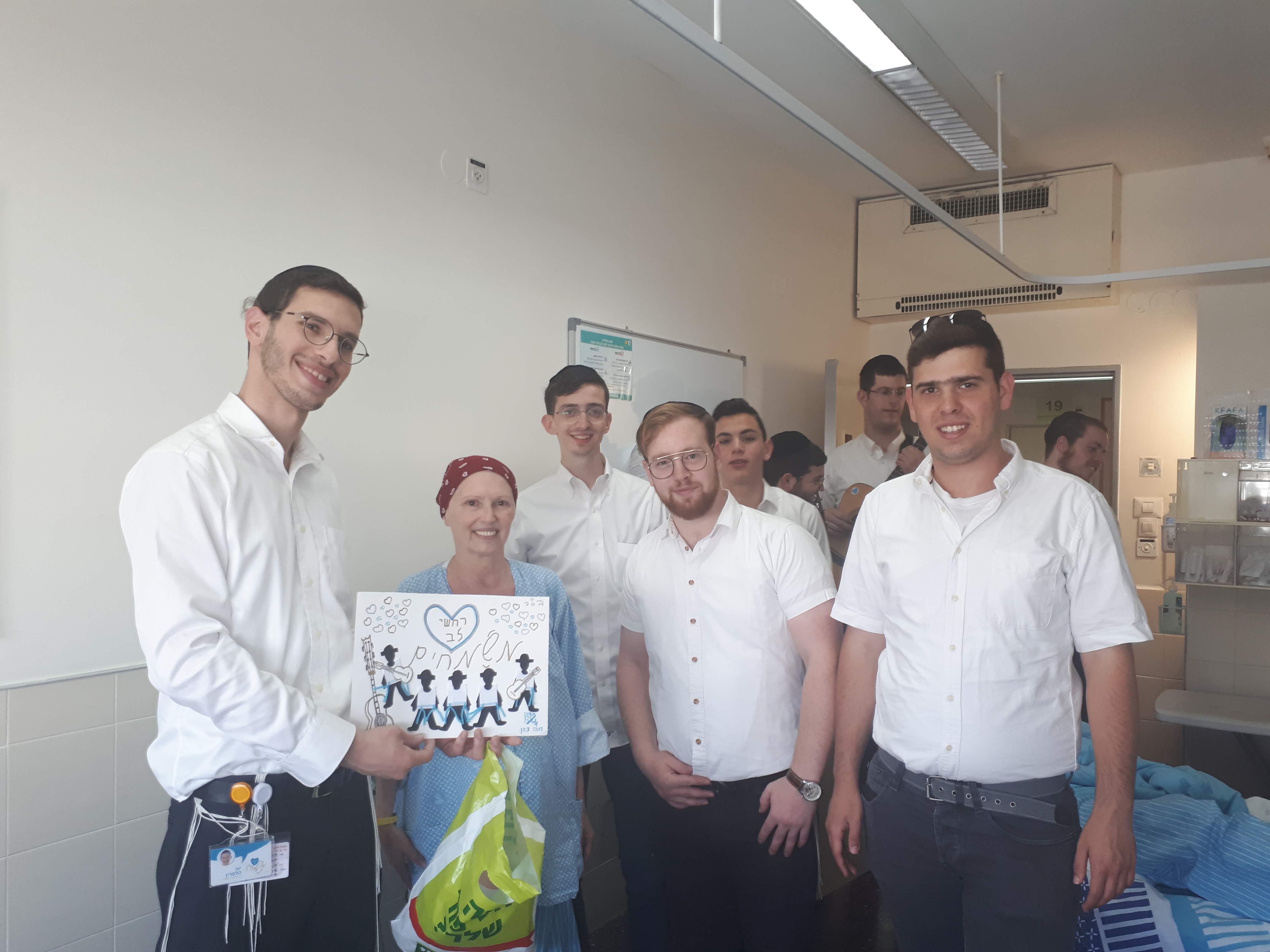 (Photo: HaMeshamechim Rachshei Lev)
(Photo: HaMeshamechim Rachshei Lev)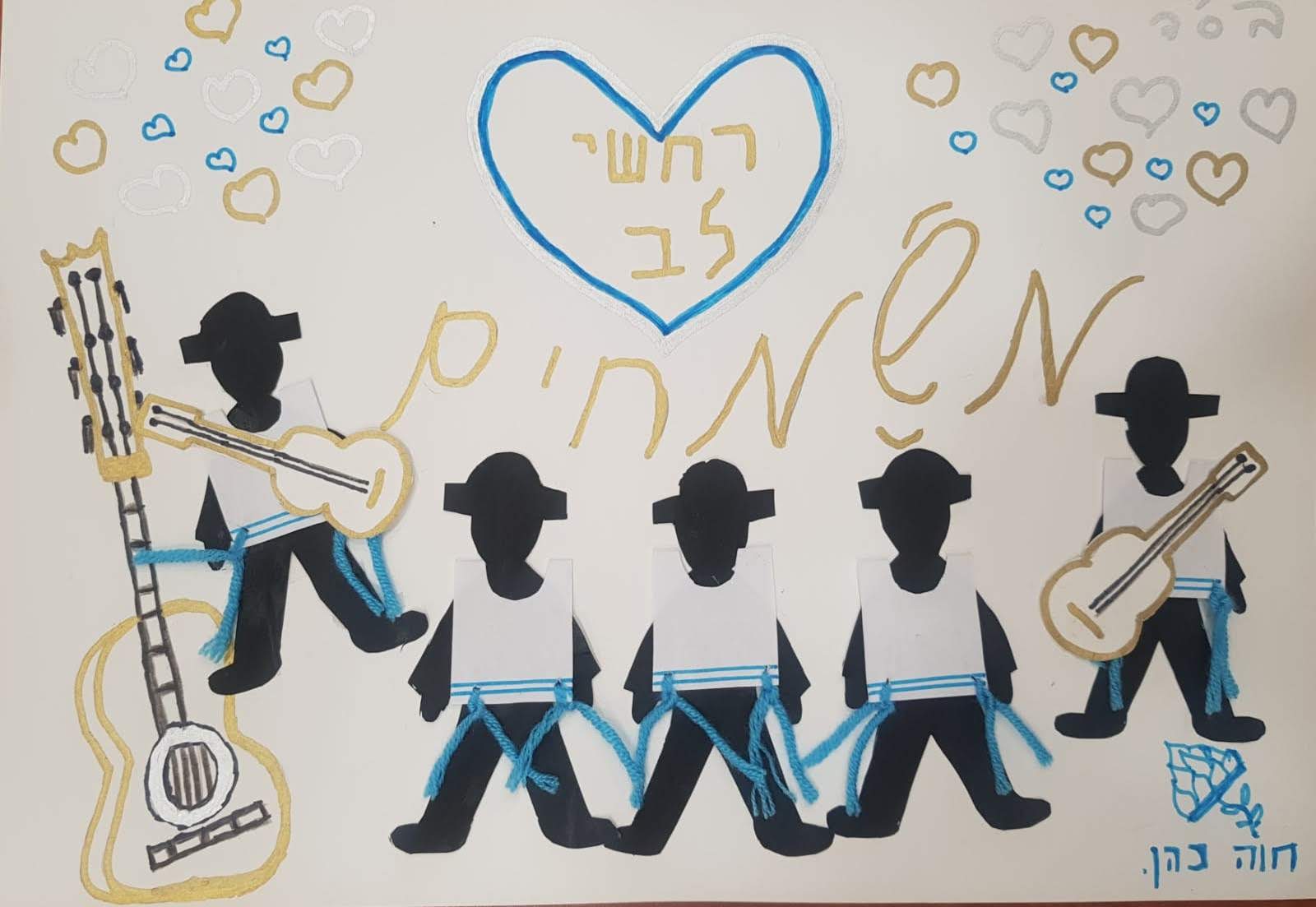 Creation by a patient
Creation by a patient"Indeed, our activities today are incomparable to what they were at the beginning, both in our endless possibilities to care for patients and in the cohesion of volunteers, which is so important in this place.
"I'll give a small example: every Thursday, right after volunteering, all the volunteers gather from different departments for an amazing cholent that our precious director Rami prepares to pamper us. And if Rami is pampering, he won't leave the families of the patients aside. Thus, more tables open up for the patients' families.
"It happened a few years ago," says Reuven, another volunteer of 'HaMeshamechim,' excitedly. "There was a Jewish man in his sixties, a great scholar who served other great scholars all his life. Unfortunately, he got cancer, and the doctors gave up on him. What was very sad was that he also despaired of his life. His son asked us to come and play music for him, to cheer him up and relieve his despair and pain. We were glad to come, sang, rejoiced, and danced; it was very moving. That's when I got to know him.
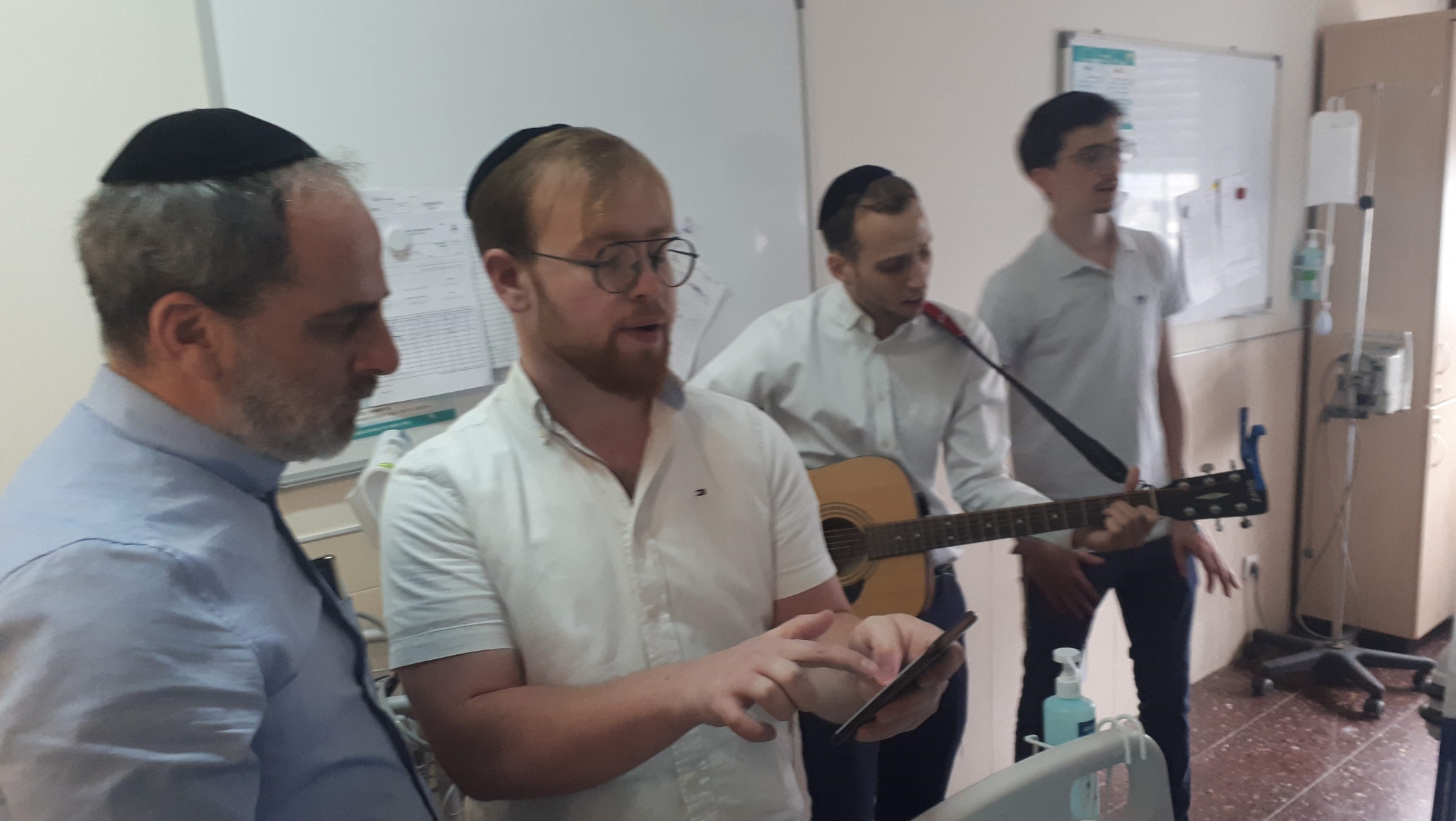 (Photo: HaMeshamechim Rachshei Lev)
(Photo: HaMeshamechim Rachshei Lev)"A few days later, while we were in the department, we met his son in the hallway, looking dejected and sad. 'That's it, we're done,' he said. 'Father hasn't been conscious for 48 hours, I understand it's over,' he continued in a low voice. But despair is not in our lexicon, nor in any of the volunteers of 'Rachshei Lev.' It doesn't work together. We immediately entered with all the guys, with a guitar and an accordion, and started playing him the Shabbat songs he loved. While singing, we noticed he raised his hand, signaling he was very pleased. A few hours later, he woke up completely," Reuven recounts excitedly.
"For me," he emphasizes, "as a new volunteer, I decided I would go for it with all my heart and soul. It was, for me, a demonstration of life-saving. A few weeks later, on Yom Kippur close to Neilah prayer, he returned his soul to his Creator."
When Shlomo, another volunteer, hears the story, he shares his part of the story as well, recounting: "On another occasion, when I met his son, he told me his father said there are two types of cancer: one before the event we did for him, and one after. It gave us a lot of strength to continue."
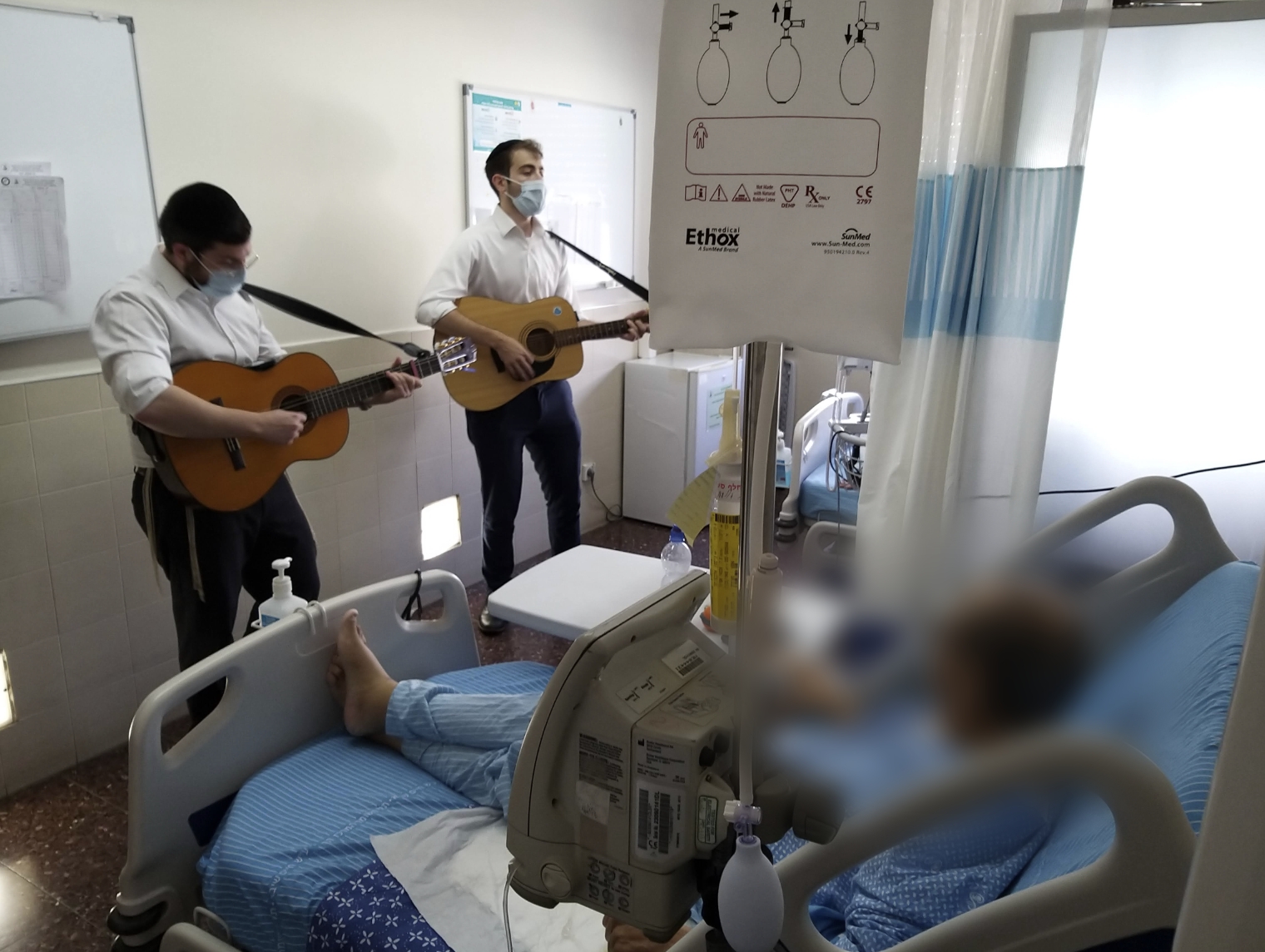 (Photo: HaMeshamechim Rachshei Lev)
(Photo: HaMeshamechim Rachshei Lev)Shlomo shares another story: "Take for example Yosef Chaim, a patient full of joy for life, whose bone marrow transplant was very difficult. One time we came, he told us sadly that praying was becoming difficult for him. 'How can one recite 'Pesukei deZimra' with sadness?' he asked us. A few minutes later, the verses acquired their exact meaning, along with singing and melody that broke through all barriers."
How Nice When Things End with a Smile
"Give me another touching story," I ask, and receive one immediately. It turns out the stories abound there in the unique enterprise. "A completely healthy girl decided for her own reasons that she wanted to be vegetarian. After a few weeks of vegetarianism, she didn't feel well but attributed it to her dietary changes. As the discomfort increased, her mother urged her to undergo blood tests. She obeyed her, and after the tests went to the beach with a friend, there she received a phone call from her family doctor, ordering her to rush to the hospital emergency room. The girl tried to postpone it until she could get ready at home, but the doctor told her it was a matter of life and death. She arrived at the hospital, and twelve hours later, she was already hooked to chemotherapy. In oncological terms, it was rare and very quick. The girl didn't understand where it was coming from, after all, just a few hours earlier she was at the beach, with all of her beautiful life ahead of her, and now she was in a whirlwind with all kinds of bad news. It was clear that her mental state was severely shaken, and accordingly, we were hastily called.
"We came, played, and made joy as we know how. She told me afterward that it felt like an island of sanity in the storm that had suddenly engulfed her. That's what gives us strength," they explain to me.
Unlike previous times, this time I dared not ask about the condition of the girl in question, because there is only so much I can absorb in one conversation. But they beat me to it: "Thank Hashem, she recovered from the severe condition she was in, and who knows if not thanks to the strength we gave her".
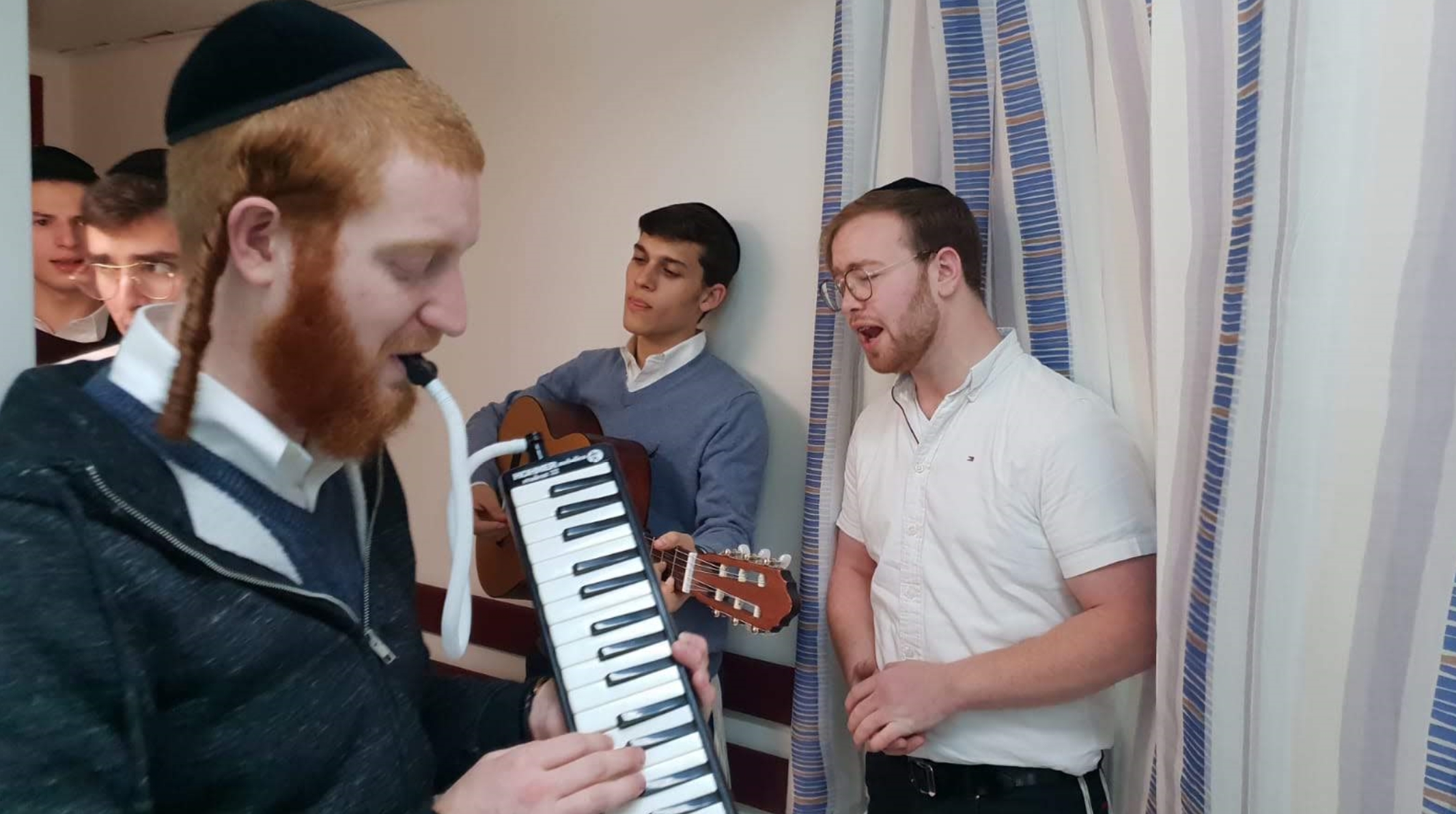 (Photo: HaMeshamechim Rachshei Lev)
(Photo: HaMeshamechim Rachshei Lev)How do the patients receive you?
"The patients always await us with bated breath. Even when there were instances of patients who caused us a bit of discomfort, it always ended well."
What do you mean by that?
Shlomo tells me the following story: "One time we came to cheer up a patient who was far from Judaism. She asked us, 'Why don't you have girls singing with you?' I asked her, 'Do you want me to arrange for a girl to sing for you?' She said yes. I told her, no problem, I will arrange not just one girl but several girls to sing for you. She said, 'No, I want you to sing together with the girls.' I told her it's not possible, and we moved to the next room, where we made joy as we know how. Then the patient from the previous room came to call us. 'I must have you come sing for me too, even without girls.' We came to sing for her and made her happy. 'Her ways are ways of pleasantness, and all her paths are peace,' it ended well."
Reuven touches on a very important point. "On one occasion we were playing, a senior doctor approached us from the ward and said to me, 'Enough, finish this, you're annoying.' I was shocked, especially since I knew her. We left quietly, without arguing. While leaving, one of the nurses approached me and said, 'Don't take it seriously, the doctor is under a lot of pressure right now because of an urgent medical event, but know that every time you come here to play, that doctor who yelled at you takes a corner and cries with you.' It's not me who said that, it's what the nurse told me."
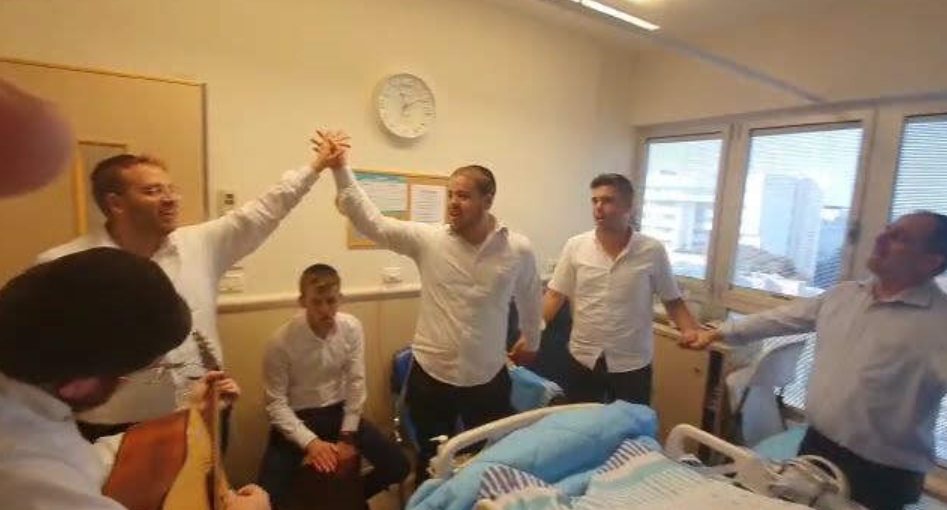 (Photo: HaMeshamechim Rachshei Lev)
(Photo: HaMeshamechim Rachshei Lev)I understand that to hold these events, you must have a good relationship with the medical staff?
"Correct. We have a very good relationship with the staff, and they even encourage our activities. Furthermore, they also direct us on which patient needs urgent attention and for whom intensive care is vital.
Maybe we can quote one of the senior doctors in the ward to understand their perspective — 'like a ray of light in the darkness of patients' lives'. With such a warm and supportive environment, it’s a pleasure to work.
"Unfortunately, due to the coronavirus, we had to take a two-month break. When we returned, adhering to all medical restrictions, it was evident how much we were missed by both patients and staff."
Finally, Yoni tells me about a particularly touching case. "In the framework of the music and happiness we created in the ward, I met Beni Brif, a young man from Mir Brachfeld Yeshiva, who suffered from a severe form of cancer. Beni enjoyed the music so much that he decided, during his illness, to join the team of volunteers. He had a unique play style, and given his situation, it was especially moving. The great wonder about Beni was that he managed to hide his illness and treatments from his friends in the yeshiva. He was the first to receive treatment in the morning, from there he would quickly travel to the yeshiva and manage to make it to the second session.
"Unfortunately, Beni is no longer with us, but his spirit compels us, even in difficult times. We know this is a mission, and we strive to continue. His dear father, Shuki, volunteers with us tirelessly, wandering all day from department to department, from room to room, assisting every family lost on their path. He does it in memory of Beni, may his memory be blessed."

